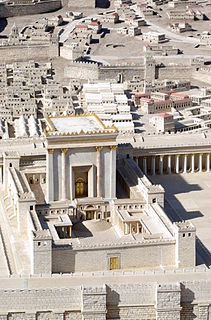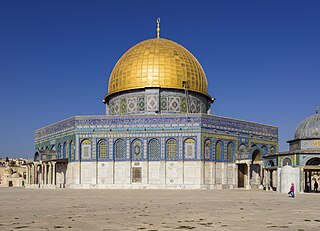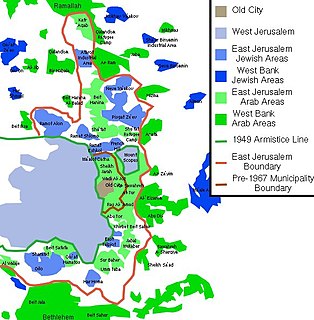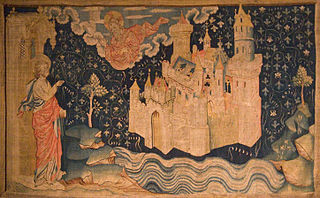Related Research Articles

Jerusalem is a city in the Middle East, located on a plateau in the Judaean Mountains between the Mediterranean and the Dead Sea. It is one of the oldest cities in the world, and is considered holy to the three major Abrahamic religions—Judaism, Christianity, and Islam. Both Israel and the Palestinian Authority claim Jerusalem as their capital, as Israel maintains its primary governmental institutions there and the State of Palestine ultimately foresees it as its seat of power; however, neither claim is widely recognized internationally.

The Temple in Jerusalem was any of a series of structures which were located on the Temple Mount in the Old City of Jerusalem, the current site of the Dome of the Rock and Al-Aqsa Mosque. These successive temples stood at this location and functioned as a site of ancient Israelite and later Jewish worship. It is also called the Holy Temple.

The Temple Mount, known to Muslims as the Haram esh-Sharif and the Al Aqsa Compound, is a hill located in the Old City of Jerusalem that for thousands of years has been venerated as a holy site, in Judaism, Christianity, and Islam alike.

The Dome of the Rock is an Islamic shrine located on the Temple Mount in the Old City of Jerusalem. It was initially completed in 691–92 CE at the order of Umayyad Caliph Abd al-Malik during the Second Fitna on the site of the Second Jewish Temple, destroyed during the Roman Siege of Jerusalem in 70 CE. The original dome collapsed in 1015 and was rebuilt in 1022–23. The Dome of the Rock is in its core one of the oldest extant works of Islamic architecture.

The Second Temple was the Jewish holy temple which stood on the Temple Mount in Jerusalem during the Second Temple period, between 516 BCE and 70 CE. It replaced Solomon's Temple, which was destroyed by the Neo-Babylonian Empire in 586 BCE, when Jerusalem was conquered and part of the population of the Kingdom of Judah was taken into exile to Babylon.

The Mount of Olives or Mount Olivet is a mountain ridge east of and adjacent to Jerusalem's Old City. It is named for the olive groves that once covered its slopes. The southern part of the Mount was the Silwan necropolis, attributed to the ancient Judean kingdom. The mount has been used as a Jewish cemetery for over 3,000 years and holds approximately 150,000 graves, making it central in the tradition of Jewish cemeteries. Several key events in the life of Jesus, as related in the Gospels, took place on the Mount of Olives, and in the Acts of the Apostles it is described as the place from which Jesus ascended to heaven. Because of its association with both Jesus and Mary, the mount has been a site of Christian worship since ancient times and is today a major site of pilgrimage for Catholics, the Eastern Orthodox, and Protestants.

The Western Wall, Wailing Wall, or Kotel, known in Islam as the Buraq Wall, is an ancient limestone wall in the Old City of Jerusalem. It is a relatively small segment of a far longer ancient retaining wall, known also in its entirety as the "Western Wall". The wall was originally erected as part of the expansion of the Second Jewish Temple begun by Herod the Great, which resulted in the encasement of the natural, steep hill known to Jews and Christians as the Temple Mount, in a large rectangular structure topped by a huge flat platform, thus creating more space for the Temple itself and its auxiliary buildings. For Muslims, it is traditionally the site where the Islamic Prophet Muhammad tied his winged steed, al-Buraq, on his Isra and Mi'raj to Jerusalem before ascending to paradise, and constitutes the Western border of al-Haram al-Sharif.

The Jerusalem Post is a broadsheet newspaper based in Jerusalem, founded in 1932 during the British Mandate of Palestine by Gershon Agron as The Palestine Post. In 1950, it changed its name to The Jerusalem Post. In 2004, the paper was bought by Mirkaei Tikshoret, a diversified Israeli media firm controlled by investor Eli Azur. In April 2014, Azur acquired the newspaper Maariv. The newspaper is published in English and French editions.

Zion is a placename often used as a synonym for Jerusalem as well as for the Land of Israel as a whole. The word is first found in 2 Samuel 5:7 which dates from c. 630–540 BCE according to modern scholarship. It originally referred to a specific hill in Jerusalem, located to the south of Mount Moriah. Mount Zion held a Jebusite fortress of the same name that was conquered by David and was re-named the City of David; see Names of Jerusalem. That specific hill ("mount") is one of the many squat hills that form Jerusalem, which also includes Mount Moriah, the Mount of Olives, etc. Over many centuries, until as recently as the Ottoman era, the city walls of Jerusalem were rebuilt many times in new locations, so that the particular hill known as Mount Zion is no longer inside the city wall, but its location is now just outside the portion of the Old City wall forming the southern boundary of the Jewish Quarter of the current Old City. Most of the original City of David itself is thus also outside the current city wall.

The Greek Orthodox Patriarch of Jerusalem or Eastern Orthodox Patriarch of Jerusalem, officially Patriarch of Jerusalem, is the head bishop of the Greek Orthodox Patriarchate of Jerusalem, ranking fourth of nine Patriarchs in the Eastern Orthodox Church. Since 2005, the Eastern Orthodox Patriarch of Jerusalem has been Theophilos III. The Patriarch is styled "Patriarch of the Holy City of Jerusalem and all Holy Land, Syria, beyond the Jordan River, Cana of Galilee, and Holy Zion." The Patriarch is the head of the Brotherhood of the Holy Sepulchre, and the religious leader of about 130,000 Eastern Orthodox Christians in the Holy Land, most of them Palestinians.

Palestine, officially the State of Palestine, is a de jure sovereign state in Western Asia claiming the West Bank and Gaza Strip with East Jerusalem as the designated capital, although its administrative center is currently located in Ramallah. The entirety of territory claimed by the State of Palestine has been occupied by Israel since the Six-Day War in 1967. Palestine has a population of 4,816,503 as of 2016, ranked 123rd in the world.

The Old City is a 0.9 square kilometers (0.35 sq mi) walled area within the modern city of Jerusalem.

East Jerusalem or Eastern Jerusalem is the sector of Jerusalem that was occupied by Jordan during the 1948 Arab–Israeli War, as opposed to the western sector of the city, West Jerusalem, which was occupied by Israel. Since the 1967 Arab–Israeli War, East Jerusalem has been, along with the rest of the West Bank, occupied by Israel.

In the Book of Ezekiel in the Hebrew Bible, New Jerusalem is Ezekiel's prophetic vision of a city centered on the rebuilt Holy Temple, the Third Temple, to be established in Jerusalem, which would be the capital of the Messianic Kingdom, the meeting place of the twelve tribes of Israel, during the Messianic era. The prophecy is recorded by Ezekiel as having been received on Yom Kippur of the year 3372 of the Hebrew calendar.

The Greek Orthodox Church of Jerusalem, officially called simply the Patriarchate of Jerusalem, is an autocephalous Church within the wider communion of the Eastern Orthodox Christianity. It is headed by the Greek Orthodox Patriarch of Jerusalem, the incumbent being Theophilos III since 2005. Christians believe that it was in Jerusalem that the Church was established on the day of Pentecost with the descent of the Holy Spirit on the disciples of Jesus Christ and that the Gospel of Christ spread from Jerusalem. The Church celebrates its liturgy in the Byzantine Rite, whose original language is Koine Greek, the original language of the New Testament, and follows its own calendar of feasts, preserving the Julian calendar. It is also often called "Σιωνίτις Εκκλησία".

The Siege of Jerusalem in the year 70 CE was the decisive event of the First Jewish–Roman War, in which the Roman army captured the city of Jerusalem and destroyed both the city and its Temple. The Roman army, led by the future Emperor Titus, with Tiberius Julius Alexander as his second-in-command, besieged and conquered the city of Jerusalem, which had been controlled by Judean rebel factions since 66 CE, following the Jerusalem riots of 66, when the Judean provisional government was formed in Jerusalem.

The status of Jerusalem is disputed in both international law and diplomatic practice, with both the Israelis and Palestinians claiming Jerusalem as their capital city. The dispute has been described as "one of the most intractable issues in the Israel–Palestine conflict", with conflicting claims to sovereignty over the city or parts of it, and access to its holy sites. The main dispute revolves around the legal status of East Jerusalem and especially the Old City of Jerusalem, while broader agreement exists regarding future Israeli presence in West Jerusalem in accordance with Israel's internationally recognised borders. The majority of United Nations (UN) member states hold the view that the final status of Jerusalem should be resolved through negotiation, and have therefore favored locating their embassies in Tel Aviv prior to a final status agreement. However, in recent years the international consensus to abstain from expressing a viewpoint on the city's final status has shown signs of fragility, with Russia, the United States and Australia adopting new policy positions. Furthermore, the proposal that Jerusalem should be the future capital of both Israel and Palestine has also gained international support, with endorsements coming from both the United Nations and the European Union.

The National Library of Israel, formerly Jewish National and University Library, is the library dedicated to collecting the cultural treasures of Israel and of Jewish heritage. The library holds more than 5 million books, and is located on the Givat Ram campus of the Hebrew University of Jerusalem.

Israel, also known as the State of Israel, is a country in Western Asia, located on the southeastern shore of the Mediterranean Sea and the northern shore of the Red Sea. It has land borders with Lebanon to the north, Syria to the northeast, Jordan on the east, the Palestinian territories of the West Bank and Gaza Strip to the east and west, respectively, and Egypt to the southwest. The country contains geographically diverse features within its relatively small area. Israel's economic and technological center is Tel Aviv, while its seat of government and proclaimed capital is Jerusalem, although the state's sovereignty over Jerusalem has only partial recognition.

On December 6, 2017, US President Donald Trump announced the United States recognition of Jerusalem as the capital of Israel and ordered the planning of the relocation of the U.S. Embassy in Israel from Tel Aviv to Jerusalem. Benjamin Netanyahu, the Prime Minister of Israel, welcomed the decision and praised the announcement. On December 8, Secretary of State Rex Tillerson clarified that the President's statement "did not indicate any final status for Jerusalem" and "was very clear that the final status, including the borders, would be left to the two parties to negotiate and decide."
References
| This article about a bishop of the Early Church is a stub. You can help Wikipedia by expanding it. |